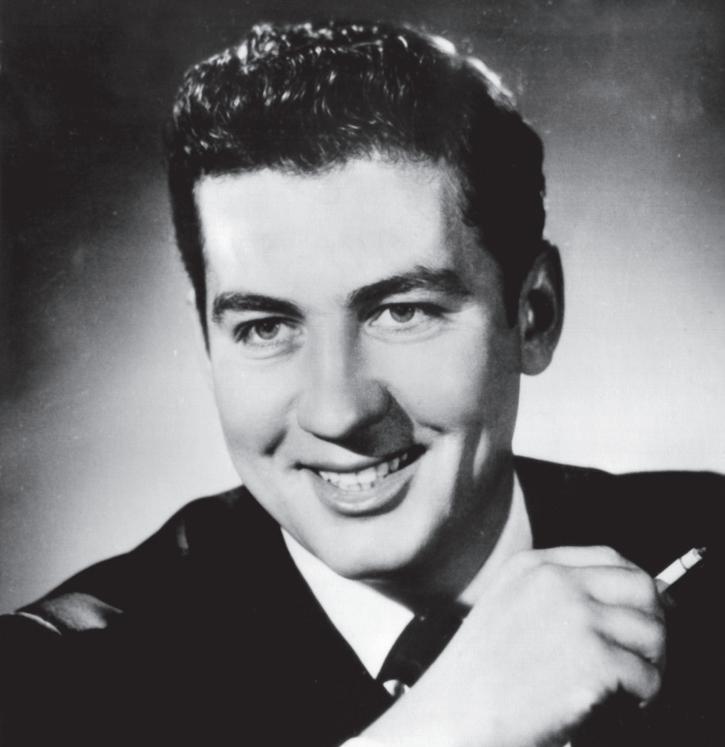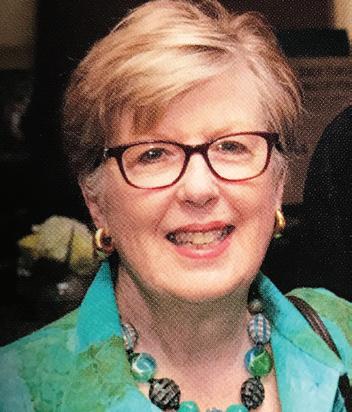
5 minute read
Fanfare
A Young Life in Music
In the 1940s, George Geyer III (’50, Voice) had recently graduated high school and was working at his family’s woodworking mill in Chambersburg, Pennsylvania. He had been a singer for most of his life, first in church choirs from the age of 6 and then on a local radio show in his spare time while working at the mill. It was Geyer’s father, George Geyer Jr., an accomplished musician who played the clarinet with the Philadelphia Orchestra, who suggested he develop those skills by studying voice at the Peabody Conservatory. “He thought it would be a good idea if I got some more formal training,” says Geyer, adding that his father, who later lost his fingers on his right hand in an accident at the mill, switched to playing the cello because he could hold the bow in his injured hand and play with his left hand.
Advertisement
Thinking back on his time at Peabody, Geyer, a voice student in the bass-baritone range, has fond memories of luncheons in his voice teacher Frank Bibb’s studios and of his recitals. In 1951, he left the Conservatory to search for a job in New York. At an audition at ABC, the manager of the department liked Geyer’s voice and sent him to Radio City Music Hall with a note for the director. “They had me come in and sing, and they hired me right on the spot,” Geyer says.
This began Geyer’s early career in music. At Radio City, he performed four shows a day, seven days a week with a male chorus in conjunction with The Rockettes. A year later, he went to Paris to join a quartet that sang an opera and a Broadway medley in Plein Feu, a show by musical-comedy star Maurice Chevalier. In 1952, Geyer returned to New York and had a variety of gigs over the next year and a half, including performing in Guy Lombardo’s production of Arabian Nights with opera singer Lauritz Melchior at the Jones Beach Marine Theatre on Long Island, and in nightclubs in New York, New Jersey, Detroit, and Washington, D.C. That year, he twice won the NBC Radio family competition show “Live Like a Millionaire,” performing with his two young daughters, ages 5 and 7. Prior to that, he won the baritone division of the Chicagoland Music Festival and was also the featured entertainer on the Île de France cruise ship and the headline attraction at the British Colonial Hotel in Nassau, Bahamas.
All of these experiences led Geyer to his next job as a baritone soloist with the Fred Waring Band, a 52-person group led by conductor Fred Waring. With the band, he toured the country, performed in a live show Sunday nights on General Electric Theater on CBS, and recorded an album with Decca Records. He also performed in a Fred Waring production of Hear! Hear! at the Ziegfeld Theatre on Broadway.
Then in 1956, Geyer changed course. He saw that the music industry was shifting toward rock ’n’ roll, a musical style that didn’t interest him. Having worked in his family’s business, Geyer knew the lumber industry, so he moved to Southern California and started working with a company that built homes. In 1969, Geyer started his own company, Geyer Industries Inc., which he oversaw until his retirement in 1982.
Today, at age 92, Geyer has donated two of his father’s cellos and his own grand piano to Peabody. Thinking about his musical career and how he got his start, he also has made a generous donation of $2 million to Peabody to support voice scholarships in his name. “I wanted to pay it forward somehow,” he says. “I thought this was the best way to do it.” — Jennifer Walker

Believing in the Power of Education
Lynne Church has long known about the Peabody Conservatory because of her mother, Elizabeth Rountree Church (TC ’27, Piano), a pianist who graduated from the school with a three-year teaching certificate in 1927. As a child, Church took piano lessons herself, though eventually, she says, “even my mother had to admit I had no talent and no real interest.”
Despite not initially taking to music, Church, who is now a second soprano with a senior rock chorus called Encore Creativity, still found a place at Peabody as an adult. She became an energy lawyer, including working as treasurer, chief auditor, and associate general counsel for Baltimore Gas and Electric Company from 1984 to 1995. During her time at BGE, Church served as the company’s representative on the Peabody Advisory Council, now called the Peabody Institute Advisory Board, for several years in the 1990s. She also knows Baltimore from her time at Goucher College, from which she graduated in 1966.
Because of all of this — her mother’s connection to Peabody, her own involvement with the advisory council, and her fondness for Baltimore — Church, who lives in Washington, D.C., has become a dedicated donor to the Conservatory. Her giving began in 1993 when she established a scholarship fund, the Elizabeth Rountree Church Memorial Scholarship, in honor of her mother. Then recently, Church made a five-year gift to support Peabody students during emergencies so they can continue to focus on their musical studies. “I believe that we have too much economic disparity in this country,” she says. “And education is one of the ways to ameliorate that.”
Church’s gift will be used to support students individually, as well as through LAUNCHPad, Peabody’s career development program. The first part, which Church calls the “Life Happens Fund,” supports students during extenuating situations that impact them financially. “It doesn’t make sense to have talented students enter the school through scholarships and other means, but then get derailed economically through life’s emergencies,” says Church. “So the first part of the gift is to help them stay in school.”
Then, through LAUNCHPad — an initiative that assists students with building career skills, preparing job applications, launching entrepreneurial ventures, and more — Church’s gift will be used to cover expenses such as competition and recital fees for students. These are experiences that are necessary for them to jumpstart their future careers.
Says Church, who “hung up her high heels” in 2006 to become a landscape designer, “A lot of people have helped me over the years, and I am fortunate now to be in a position to help others. There’s no better way than supporting the next generation of exciting musicians.” — Jennifer Walker










